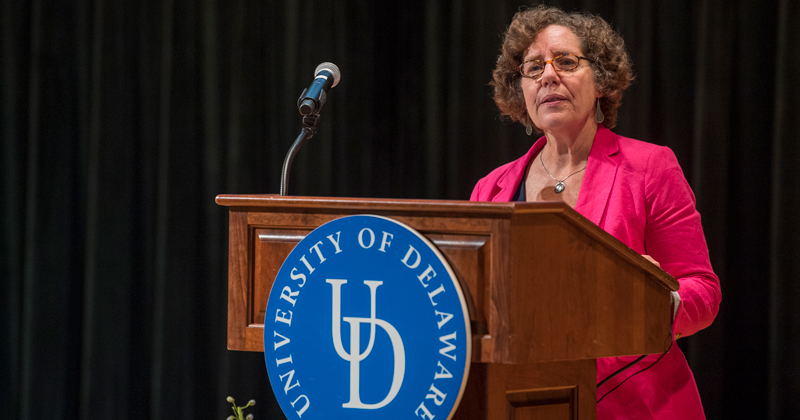


Winning the vote
Photo by Kathy F. Atkinson September 20, 2019
2019 Soles Lecture focuses on fight for women’s suffrage
Constitution Day, held each year on Sept. 17 to mark the signing of the U.S. Constitution, doesn’t commemorate a perfect document but, rather, celebrates a framework that allows for continual improvement.
Elaine Weiss, author of a bestselling book about women’s suffrage, offered that view at the University of Delaware this year on Constitution Day as she delivered the ninth annual James R. Soles Lecture on the Constitution and Citizenship to a large audience in the Center for the Arts.
The Constitutional Convention delegates who signed the document in 1787 were visionaries, but the Constitution also reflected the world view at the time of those “39 wealthy white men,” Weiss said. The framers failed to grant voting and other rights to women and non-white Americans.
“Women were not just forgotten,” Weiss told the audience. “They were purposely left out.”
Her book, The Woman’s Hour: The Great Fight to Win the Vote, tells the story of the ratification of the 19th Amendment in 1920, when a seven-decade-long fight for suffrage ended in a dramatic, down-to-the-wire battle in the Tennessee legislature.
In her talk, Weiss recounted some of the hard-fought struggles in which suffragists were intimidated, mocked and physically assaulted by opponents who argued that enfranchising women would do social, cultural and moral harm to America and its way of life.
“We were not given the vote. We were not granted the vote,” she said. “It took enormous effort.”
Suffragists persevered, she said, despite opposition from many politicians, business leaders, clergy and — “the most passionate foes of all” — other women.
“The suffragists held meetings, they held rallies, and they marched,” Weiss said. “They were ingenious and fearless. They had to be.”
In the end, when Tennessee became the final state needed to ratify the 19th Amendment, it marked the largest extension of the franchise in U.S. history, doubling the number of citizens allowed to vote, just in time for the 1920 election.
(Weiss included a brief aside about the Delaware legislature, which many had expected to provide the final vote for ratification in 1920. But, despite a lot of support for the amendment in the state, political disputes and business objections led the Delaware House to adjourn without voting on ratification, leaving Tennessee to play its historic role.)
Just as the Constitution was amended shortly after its adoption, with the addition of the Bill of Rights in 1791, it had also been amended several other times before women’s suffrage was ratified. The 15th Amendment, giving non-white men the right to vote, had been adopted 50 years earlier, in 1870.
The story of the 19th Amendment shows how the Constitution can continue to be improved, Weiss said.
“It can keep striving for a ‘more perfect union,’” she said. “The 19th Amendment corrected what the Founding Fathers conveniently forgot.”
The Woman’s Hour has won praise from critics and historians and awards including the American Bar Association’s Silver Gavel.
Steven Spielberg’s Amblin Entertainment production company has optioned film rights for an adaptation of the book, with Hillary Rodham Clinton as executive producer.
Our Vote: History. Advocacy. Justice.
The Soles Lecture this year launched a three-semester teaching initiative at UD, “Our Vote: History. Advocacy. Justice.”
In introducing Weiss as the speaker at the event, Anne M. Boylan, professor emerita of history, also introduced “Our Vote,” which, she said, “is focused on the power and privilege of suffrage, the right to vote.”
The initiative, which seeks to engage students and the campus community in learning more about the power of voting, coincides with two milestone anniversaries in 2020 — the centennial of the 19th Amendment allowing certain women the vote, and the 150th anniversary of the 15th Amendment, allowing non-white men the vote.
As plans for the initiative develop, possible activities include themed courses, guest speakers, musical and theatre performances, film series, a community reader series and student research and writing projects.
“Our Vote” is expected to extend broadly beyond the milestone anniversaries to encompass democracy and civic engagement.
James R. Soles Lecture on the Constitution and Citizenship
The lecture honors the late James R. Soles, who was a faculty member in political science for more than 34 years, in addition to commemorating the signing of the U.S. Constitution in Philadelphia on Sept. 17, 1787.
Prof. Soles, who died in 2010, received the University’s Excellence in Teaching Award twice and its Excellence in Advising Award, as well as the University’s Medal of Distinction. He received many honors and recognitions in his distinguished career, but he is still best remembered for his personal dedication to teaching and to his students.
The James R. Soles Citizenship Endowment supports a named professorship, undergraduate citizenship stipends and graduate fellowships.
The first stipends were awarded more than 10 years ago, and recipients have used that support in a wide range of accomplishments. To see more about recent recipients and the work they have done, visit this website.
Contact Us
Have a UDaily story idea?
Contact us at ocm@udel.edu
Members of the press
Contact us at 302-831-NEWS or visit the Media Relations website

